How Trump could use Space Force to rebrand for 2020

The Trump campaign’s $30 Space Force shirts.
In the modern history of presidential campaigns, we’ve never had anything like President Trump’s Space Force merchandise.
The Trump campaign store currently sells a $30 raglan shirt and two $35 hats, in red and black. Each is described as “Official,” and they’re a rarity in the store because they don’t appear to include Trump’s name on the outside.
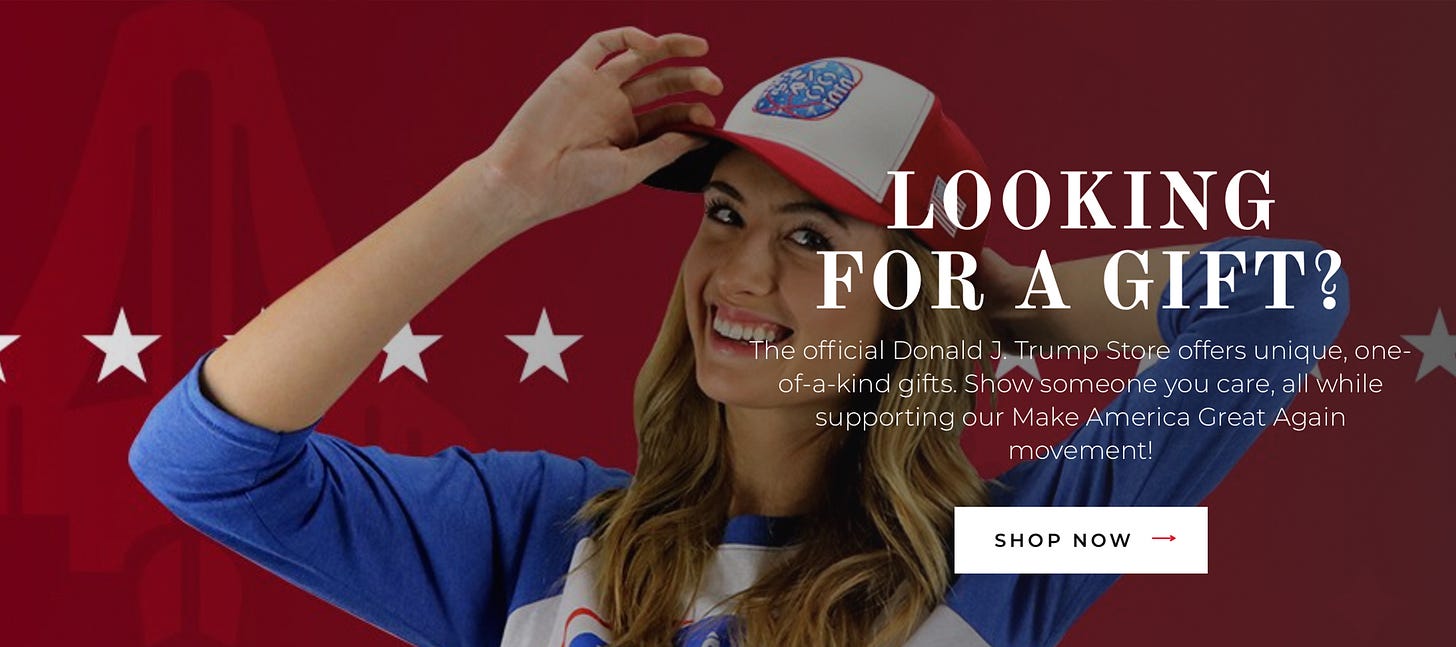
A model featured on the Trump campaign store website sporting Space Force gear.
Using a possible future branch of the military for political fundraising is unprecedented for modern presidential candidates. In fact, we don’t see military branding in politics much at all because it’s not allowed.
The Department of Defense prohibits unauthorized use of its military service marks, including official seals and other logos. Service branches are able to license their marks out for commercial use, though (among the current Air Force licensees are Cracker Barrel, which sells rocking chairs, and Fathead, which sells wall decals). DOD branding guidelines prohibit service marks from being used for advertising and fundraising.
When a politician does use a military branding, the military can tell them to stop. That happened last week to Rep. Duncan Hunter (R-Calif.), who received a cease-and-desist letter from the Marine Corps Trademark Licensing Office regarding his use of the Marine emblem and slogan on a fundraising mailer.
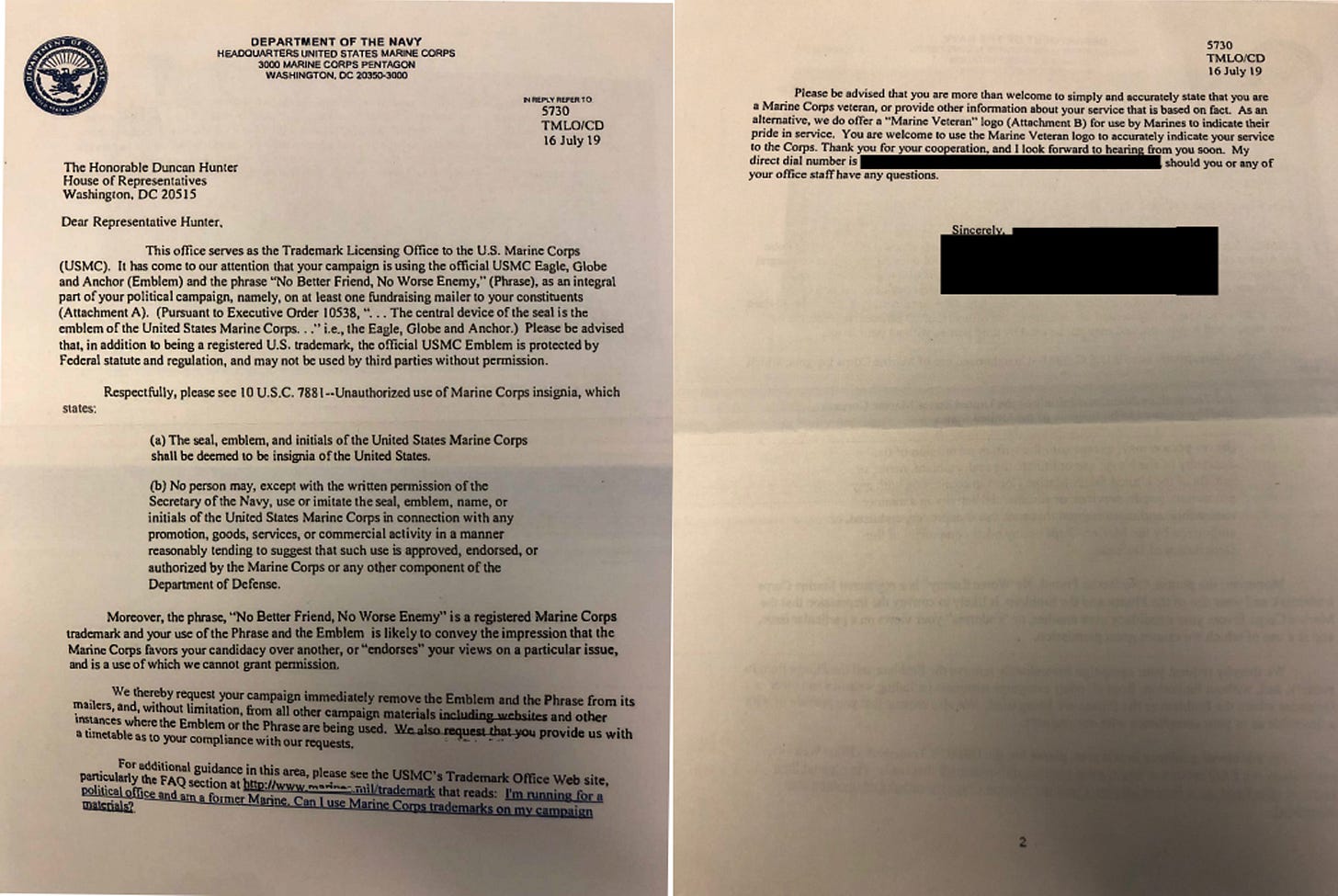
The cease-and-desist letter sent by the Marine Corps Trademark Licensing Office to Rep. Duncan Hunter’s campaign.
In the letter, dated last Tuesday, July 16 and obtained by NBC, the office asked the campaign to “immediately” remove the Marine emblem and slogan from all campaign materials since it violated rules that the marks “should not be used in conjunction with any political activities.”
(A recent Hunter mailer that showed the Marine’s eagle-and-globe emblem accused Democrats including Reps. Ilhan Omar of Minnesota and Rashida Tlaib of Michigan of having ties to terrorism and being anti-Semitic. The two congresswomen were among those targeted in Trump’s racist “go back” tweet and Hunter’s mailer was criticized for being Islamaphobic. A Marine veteran, Hunter was indicted on federal charges. He pled not guilty.)
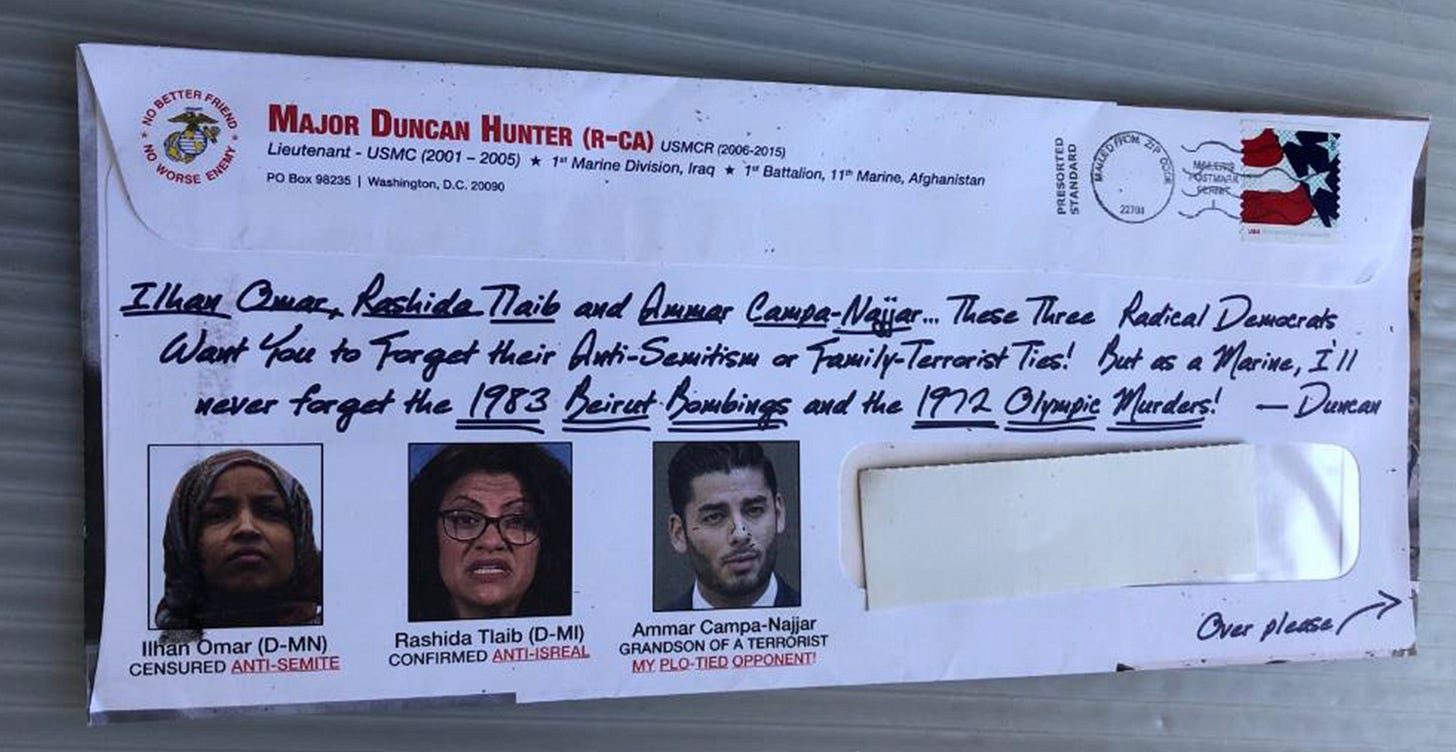
A Hunter campaign mailer that featured the Marine’s emblem and was criticized for being Islamaphobic.
While military marks are off limits for politics, a possible loophole for the Trump campaign’s use of Space Force is the fact that the proposed sixth branch of the military doesn’t currently exist.
“Until the Space Force is something, until it’s actually created, I’m not sure that any trademark prohibitions would be implicated,” Brendan Fischer, a director at the nonpartisan Campaign Legal Center told Yello in an interview.
“What I don’t know is whether the president himself can authorize the use of the logo in his campaign or for any other use given the fact he’s the commander in chief,” he said.
The House and Senate haven’t yet agreed on the details for a Space Force, and in fact, a name hasn’t even been settled on. The House Armed Services Committee voted in June to call it the “Space Corps.”
But the Air Force, which established a Space Command in 1982 and under which a future space branch would be organized, has made a move to protect a potential trademark.
On March 13, at least a month after the Trump campaign first began selling Space Force clothing, the Air Force office of general council filed a trademark for “Space Force” for clothing. As of press time, they have not filed for a trademark for other goods.
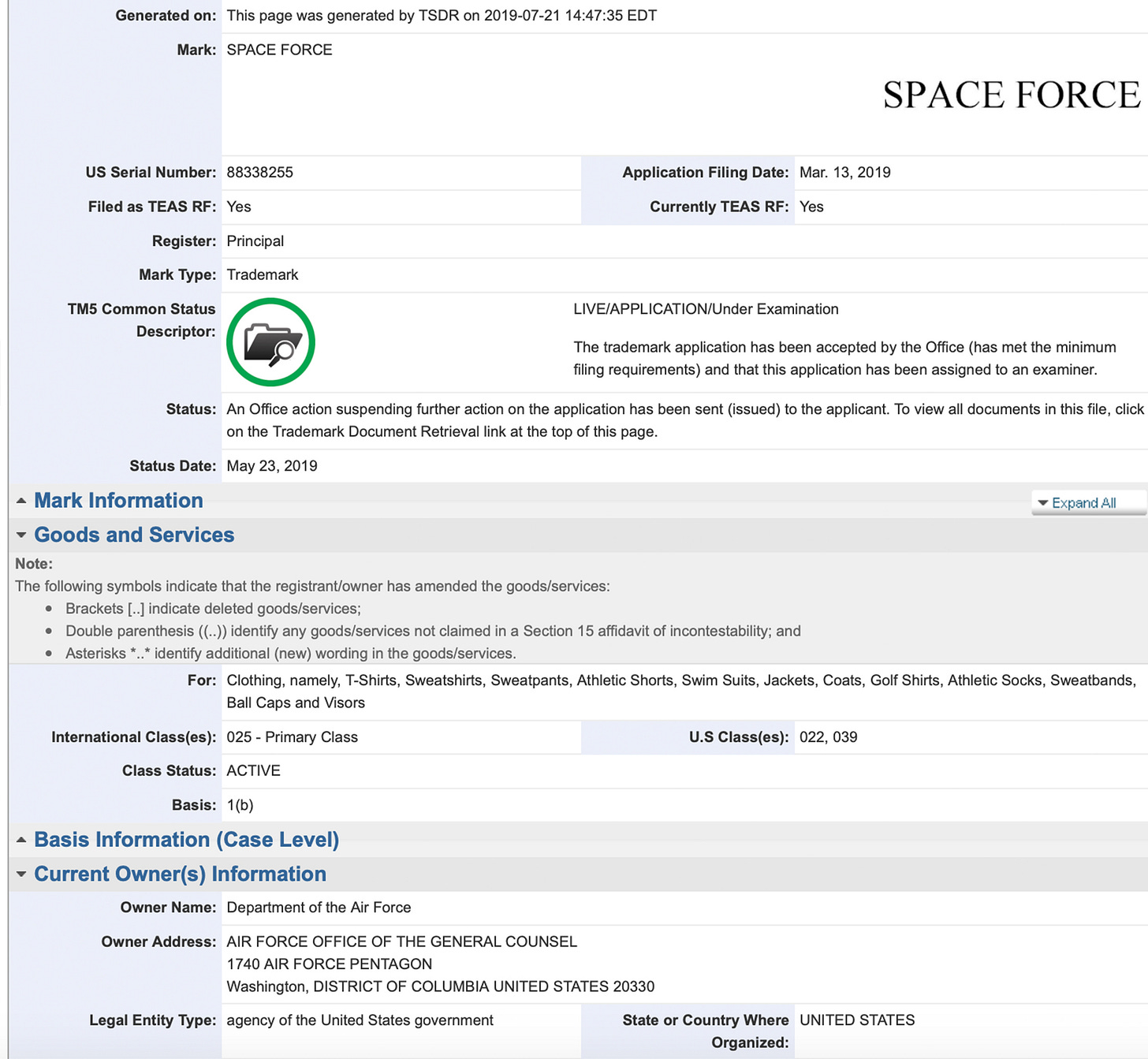
The Air Force Office of the General Counsel registered the trademark for “Space Force” for clothing on March 13, 2019, after the Trump campaign began selling Space Force clothing.
Fischer said in some ways, Trump’s merchandise is similar to Sen. Bernie Sanders’ campaign selling “Medicare For All” merchandise. “It’s a policy proposal that has not yet been enacted,” he said.
But the reason the military tries to keep its branding out of politics is to “protect the non-partisan, non-political nature of the military,” Fischer said.
“The reason for these rules are to avoid implying that the military is endorsing any particular political candidate,” he said.
The Space Force logo that appears on some of the Trump merchandise was among the options Trump supporters were asked to vote on in a campaign email sent in 2018.
The designs are more Buzz Lightyear than Buzz Aldrin, with cartoon rockets blasting off. One is a color-swapped mash-up inspired by NASA’s “meatball” and “worm” logos.
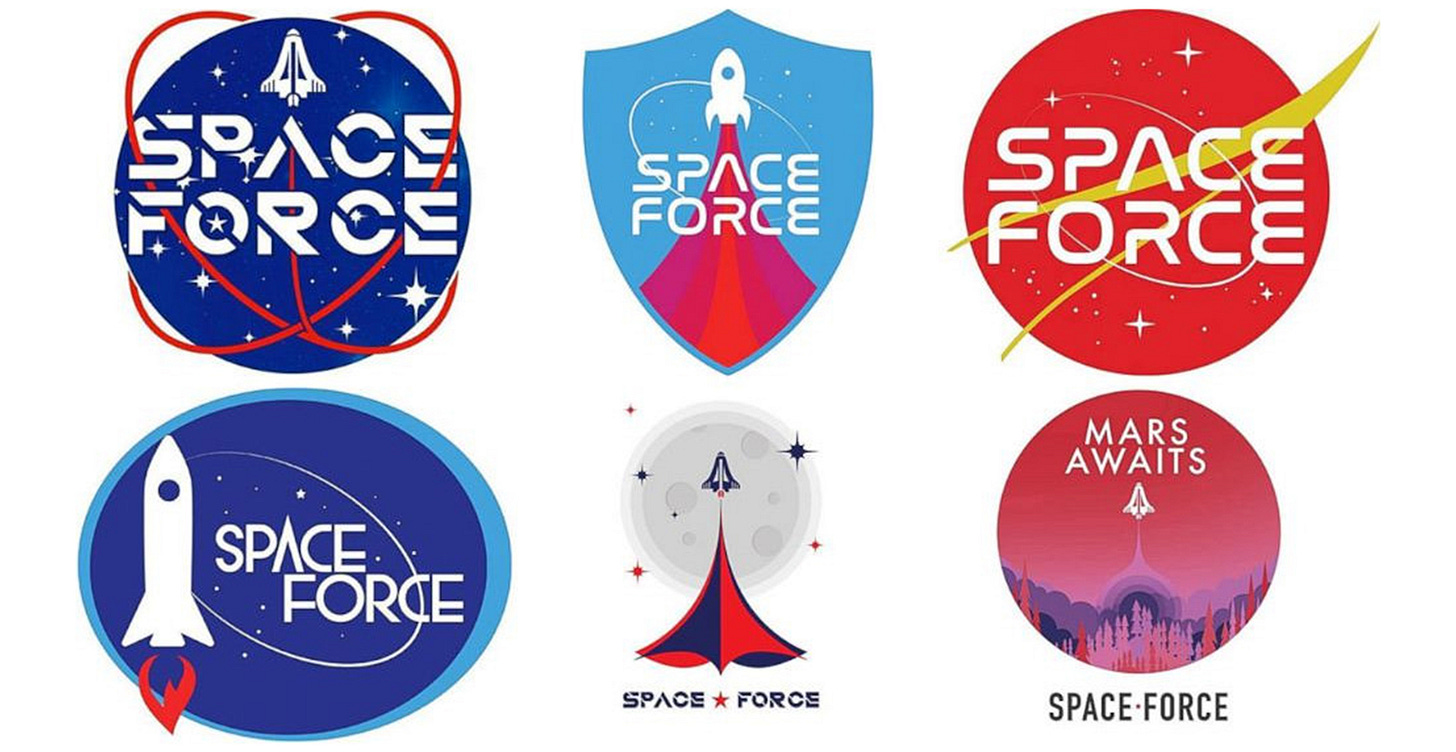
Space Force logos sent out by the Trump campaign to supporters.
When the logos were sent out last year, Norman Eisen, the ethics czar under former President Obama, told Newsweek that fundraising off Space Force “creates the impression and perhaps the reality that official government decision-making may be influenced by merchandising opportunities.”
A representative from the Trump campaign did not respond to an email asking the campaign’s response to Eisen’s criticism and whether the campaign will continue to sell Space Force merchandise should the branch be established.
Although Trump’s use of Space Force might not be ethical, it is savvy, said Bruce Newman, a DePaul University professor and editor-in-chief of the Journal of Political Marketing who consulted on Bill Clinton’s reelection campaign. He called Trump a “branding genius” who’s rebranding himself as a “futurist.”
“[Trump has] used this connection with the Space Force as a way to reposition himself for 2020,” Newman said. “He has to run in 2020 on a mantle that positions him and his brand as something that is unique and different and is a change from how he ran in 2016, which was to ‘Make America Great Again,’ which was in effect looking backwards.”
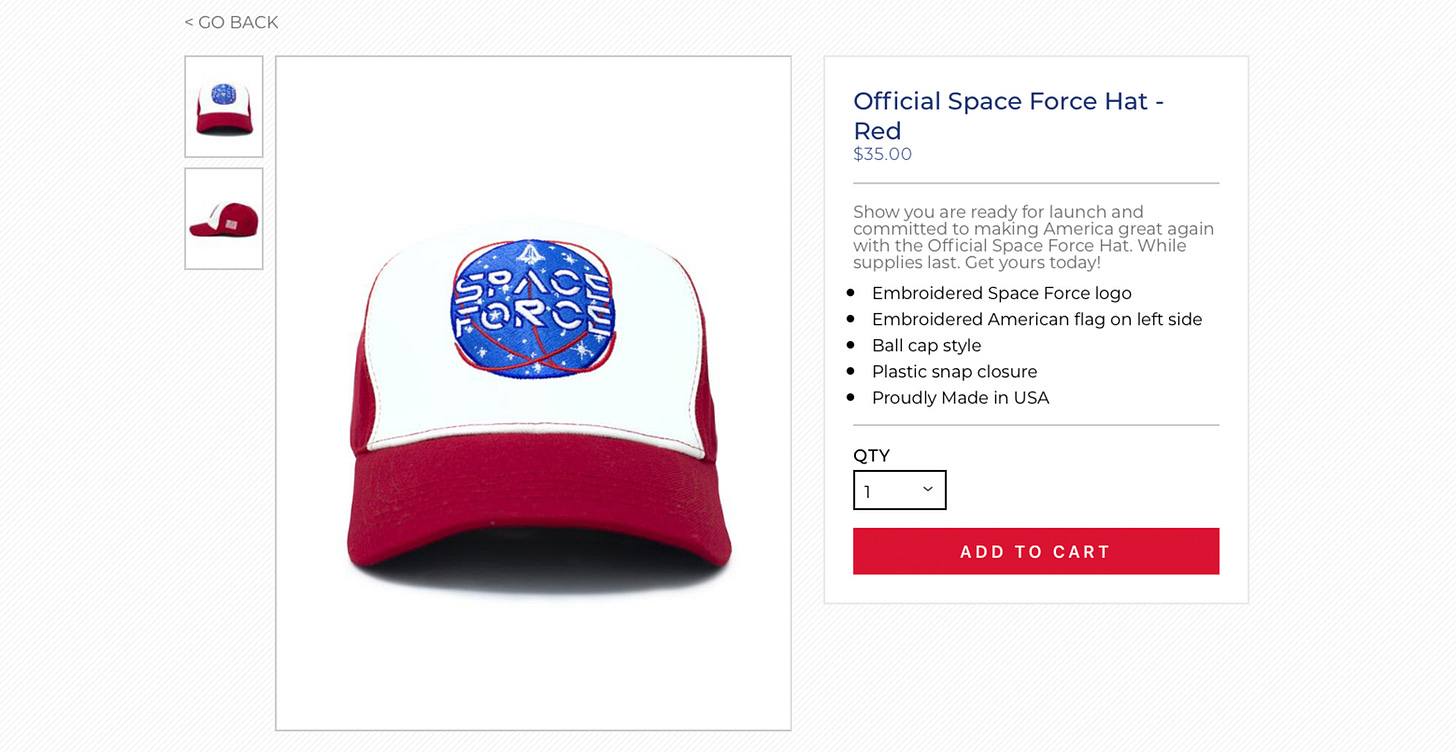
The Trump campaign’s $35 red “Official Space Force hat.”
For Trump, who didn’t serve in the armed forces and received five deferments, Space Force is a way he can draw a closer connection between himself and the military. It’s also a way to tap into Space Age nostalgia. Between the 50th anniversary of Apollo 11 and recent Gallup polls that found support for the U.S. space program at a record high, many Americans are ready to return to space.
Trump’s Space Force proposal isn’t popular, though. It faced early resistance from lawmakers from both parties who said it unnecessarily expanded bureaucracy without providing much benefit. An August 2018 CNN poll found 37% of Americans support creating it, and a March estimate pegged its cost at $2 billion over five years.
Still, there’s something fitting about space fever sweeping the U.S. during the Trump administration. The NASA brand in 2019 is both nostalgic and forward-looking, kind of like the stated goals of MAGA but without the nationalism or nativism. It promises a return to greatness in areas like science, American ingenuity, and giant leaps for mankind.
In making Space Force part of his reelection brand, Trump is disregarding norms in how presidents use connections to the military for campaigning and fundraising purposes and creating his own partisan version of a NASA-style brand.

